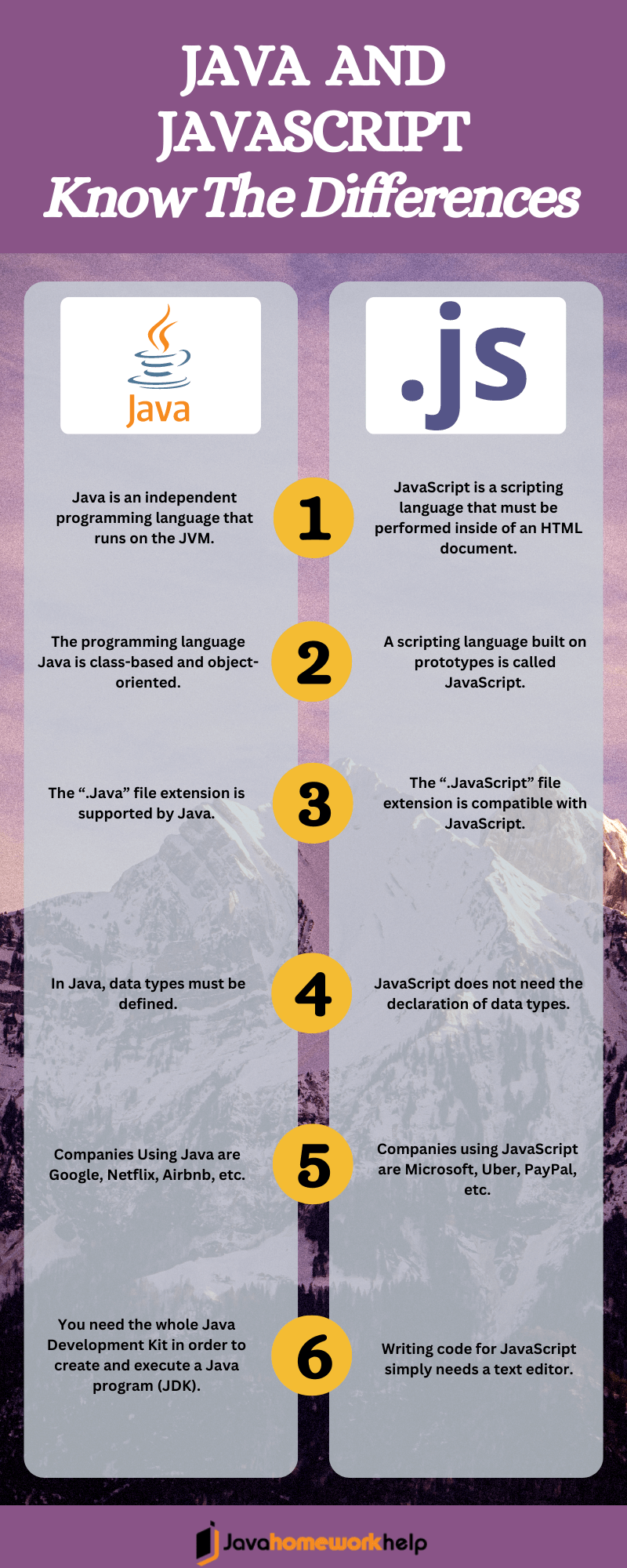It is understandable why many individuals believe that Java and JavaScript are a component of the same programming language, or at the absolute least are closely linked. However, despite sharing the name “Java” and several high-level features, both are actually rather distinct programming languages. JavaScript is a thinner programming language than Java. Students pursuing programming languages sometimes get confused between the two. Therefore, we have created this blog to help them understand the key differences between Java and JavaScript.
Since each has its own value or application, one cannot be compared to the other in terms of its capabilities or power. Both also use various plugins to run. Therefore, in this blog post, we have attempted to analyze the distinction between Java and JavaScript. This blog is created by one of the Java Homework Help writers to guide students with these two programming languages.
So, let’s get started.
Read Here: Different Types of Coding Languages
What is Java?
Java is a network-centric, object-oriented, and multi-platform programming language. Sun Microsystem first made it available in 1995, and it is also utilized as a computing platform. Later, it was purchased by Oracle Corporation.
Java was designed with the motto “Write once, run anywhere.” Since its release, it has rapidly gained popularity for building both clients- and server-side applications. Moreover, its syntax is comparable to those of C and C++. Furthermore, the syntax for declaring variables in Java is strict. The Java data types that will be kept in a particular variable must be specified by the programmer.
Features of Java
Java programming languages hold great features that make them the no. 1 choice among programmers. These features are:
- Platform-Independent: The programming language Java is platform-Independent. This means that Java code can be executed on any type of device, including mobile devices and desktop computers. It is conceivable due to Java Virtual Machine and Byte Code.
- Object-Oriented: All of the object-oriented programming features and ideas, including encapsulation, abstraction, inheritance, etc., are supported by the Java programming language.
- Safe and Dependable: It offers secure communication, public key infrastructure, authentication, cryptography, and much more to give developers a secure and dependable platform.
- Compiled and Interpreting: With Java, you can translate the source code into ByteCode and execute it on any device or platform by interpreting it on the JVM.
To know more about these features in detail, students can also take Online Java Assignment Help from professional academic experts.
Applications of Java Programming Language
Java offers a comprehensive and sophisticated set of APIs that aid developers in creating apps. Java enables users to create a variety of programs for multiple applications. One can create the following applications using Java technology:
- Game Development: Since the most robust open-source 3D engine supports Java, it is commonly employed by companies who create video games. Also, when it comes to building 3D games, the platform offers unmatched capacity.
- IoT Application: There are many different programming languages that may be used to create IoT applications, but Java gives developers an advantage that is unparalleled. Java is popular among IoT programmers due to its security, adaptability, and versatility.
- Mobile App Development: The majority of Android applications are created using Java. Java is also used for developing Android apps in the most well-known IDE, Android Studio. Therefore, creating Android applications will be considerably simpler if you are already familiar with Java.
- Web-based Applications: It is used to create web-based applications because it offers extensive support for web development with Servlet, JSP, and Struts. Due to this, Java is also referred to as a server-side programming language.
- Big Data Technology: Despite the fact that there are other programming languages for Big Data Technology, Java remains the top option. Java is used to create the Hadoop HDFS platform, which is used to process and store big data applications.
A wide range of applications, including business applications, network applications, desktop applications, online applications, games, Android apps, and many more, can be created using Java. Students who need Java Programming help online can also hire an expert for professional assistance.
Why Do Developers Use Java?
Java stands apart from other programming languages in terms of security and functionality. The following are some other justifications for why developers choose to utilize Java:
- Multi-threading: A lightweight subprocess is called Thread. Java’s multi-threading feature enables the simultaneous execution of two or more threads. It maximizes the CPU’s efficiency.
- Scalability: It is crucial because it manages workloads, improves system performance, and maximizes output.
- Memory-Management: The garbage collection feature that Java offers is used to manage memory. The objects are automatically deleted when they are no longer needed by the application. It enhances the application’s speed.
Also Read: Discover About The Career Opportunities For Java Developers
Now, let’s move forward and know about JavaScript in Detail.

What is JavaScript?
JavaScript is an object-based scripting language that helps in the development of interactive websites. This language complies with all client-side programming standards, allowing it to run entirely on the web browser without requiring any help or resources from the web server.
Brendan Eich created JavaScript in 1995. Designed for Netscape 2, it was adopted as the ECMA-262 standard in 1997.
However, The syntax for declaring variables in JavaScript is less strict than that of Java. Programmers are not required to declare the JavaScript data type that will be kept in a variable. Furthermore, no additional classes or functions are required either. Being a scripting language, it holds great complexities. However, students who are not able to deal with JavaScript assignments alone can go for taking JavaScript homework help online from subject experts.
Features of JavaScript
The features of JavaScript are as follows:
- Prototype-Based Language: Because JavaScript is a prototype-based language, it builds upon existing objects to produce new ones. Unlike Java, which creates objects first and then defines classes.
- Front-end Scripting Language: JavaScript is a front-end language that doesn’t need a lot of browsers ability to function. The time it takes to do routine tasks is greatly reduced.
- Default Parameters: JavaScript has a feature called default parameter that protects programmers’ code from failing due to a single or basic error.
- Simple scripting language: JavaScript is a simple scripting language. It means that with basic features and characteristics, it is simple to design, operates without additional calculations in the browser, and avoids placing an undue load on the RAM and processor.
These are the top features of JavaScript. However, you can know more about its feature from the professional holders of JavaScript.
Practical Applications of JavaScript
Websites and web apps are frequently made with JavaScript. Let’s talk about some real-world ways that JavaScript is used in different fields.
- Presentations: JavaScript is frequently used to build interactive presentations for websites. Users can create presentations like webpages using JavaScript even if they are not completely versed in a programming language.
- Flying Robots: Users can control various little robots, imaginative maker projects, and Internet of Things gadgets using the Node.js ecosystem. With JavaScript, explore the fascinating world of drones, flying machines, and quadcopters.
- Web Development: Web pages are created using the scripting language JavaScript. JS, which was created in Netscape, enables programmers to create dynamic and interactive web pages that interact with users and carry out complicated actions.
- Server Applications: JavaScript is also utilized to create server-side software through the open-source Node.js runtime environment. Furthermore, JavaScript aids in content creation and HTTP request management.
- Smartwatch Apps: Pebble’s JavaScript framework, Pebble.js, enables programmers to construct JavaScript-based Pebble watch applications. Simple JavaScript code can be used to create a smartwatch app.
Other than these aforementioned, JavaScript is also used in making Mobile Apps, games, web applications, etc. Moreover, one can easily create a wide range of applications using JavaScript.
Why Do Developers Use JavaScript?
Now let’s talk about the benefits of having JavaScript for the upcoming web application development project and discover why it is still the most widely used web application development language.
- Lots of Libraries and Frameworks: Building complex JavaScript-based online applications is made simple for web developers by JavaScript frameworks and libraries. There are numerous libraries in JavaScript that you can use based on your needs. Widgets like Bootstrap, jQuery, or AngularJS, for instance, can be used to construct GUIs.
- Simple JavaScript Coding: Without utilizing a specific application or tool, you can easily write JavaScript code. Simply open a notepad and enter your JavaScript code inside.
- Cross-Browser Compatible: One feature of JavaScript is that it is supported by a wide range of online browsers, including Chrome, Internet Explorer, Firefox, Safari, and Opera.
JavaScript allows you to develop extremely dynamic online applications while also making it simple to improve the application’s performance, functionality, usability, and features.
Also Read: Java vs Scala: Which Is Better?
These are some of the premium differences between Java and JavaScript. Now, let’s move forward and discuss their differences in a tabular form.
The Distinction Between Java and JavaScript
JavaScript code is directly executed by the browser, whereas Java is a built and interpreted language. Now, let’s know the key distinction between the two languages in tabular form.
| Dimension | Java | JavaScript |
| Working | Java is an independent programming language that runs on the JVM. | JavaScript is a scripting language that must be performed inside of an HTML document. |
| Language Patterns | The programming language Java is class-based and object-oriented. | A scripting language built on prototypes is called JavaScript. |
| Requirements | You need the whole Java Development Kit in order to create and execute a Java program (JDK). | Writing code for JavaScript simply needs a text editor. |
| File Extension | The “.Java” file extension is supported by Java. | The “.JavaScript” file extension is compatible with JavaScript. |
| Syntax | In Java, data types must be defined. | JavaScript does not need the declaration of data types. |
| Companies Using | Google, Netflix, Airbnb, etc. | Microsoft, Uber, PayPal, etc. |
Enroll Yourself In Online Courses And Learn About Java and JavaScript
By enrolling in online classes, you may study at your own schedule from top businesses and universities, regardless of whether you are just starting out with programming or want to step up by learning a new language like Java and JavaScript.
However, there are many online educational portals available that offer online courses in Java and JavaScript from basic to advance levels. Furthermore, you can learn and discover the fundamentals by enrolling in a course designed for beginners, such as Object Oriented Programming in Java from Duke University or JavaScript for Beginners from the University of California, Davis.
Moreover, for further assistance with your online classes and exams for these courses, you can also rely on us as well. We offer complete assistance with assignments, online classes, exams, quizzes, etc in one place. Also, students can request us to do my android assignment for me along with Java and javascript assignment help online.
FAQs
| Q: Is it simpler to learn JavaScript than Java? A: In comparison to Java, JavaScript has a smaller collection of commands and a less rigorous syntax. JavaScript is therefore far simpler to understand than Java, especially for a beginner programmer. |
| Q: Does learning JavaScript require knowledge of Java? A: No, the two languages, Java and JavaScript, have nothing in common. For JavaScript to be learned, only general programming experience is required. |
